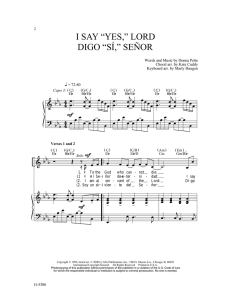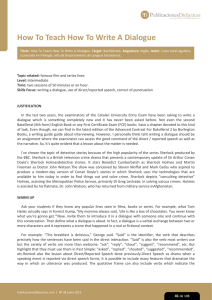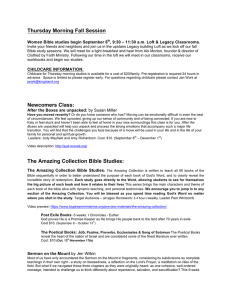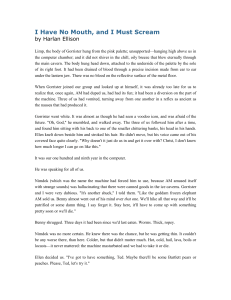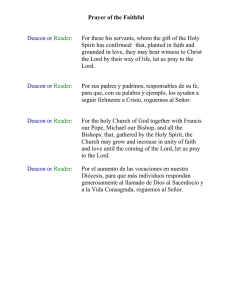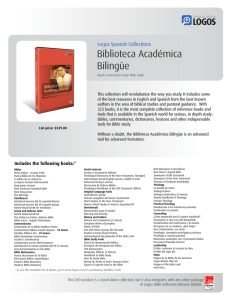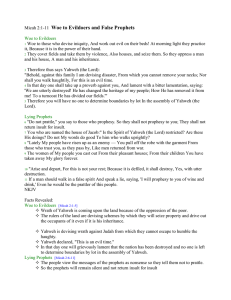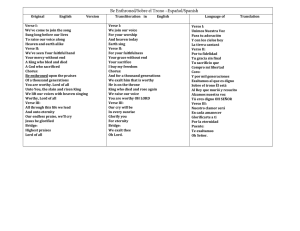The Integrity of the Prophetic Gift
Anuncio
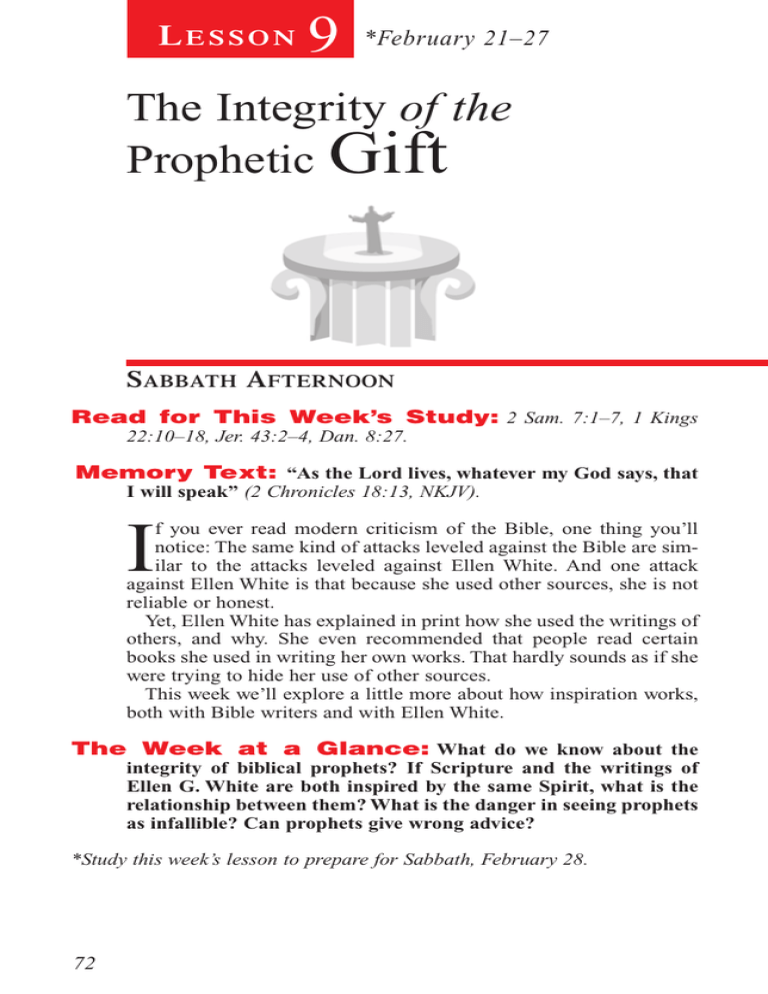
LESSON 9 *February 21–27 The Integrity of the Prophetic Gift SABBATH AFTERNOON Read for This Week’s Study: 2 Sam. 7:1–7, 1 Kings 22:10–18, Jer. 43:2–4, Dan. 8:27. Memory Text: “As the Lord lives, whatever my God says, that I will speak” (2 Chronicles 18:13, NKJV). f you ever read modern criticism of the Bible, one thing you’ll notice: The same kind of attacks leveled against the Bible are similar to the attacks leveled against Ellen White. And one attack against Ellen White is that because she used other sources, she is not reliable or honest. Yet, Ellen White has explained in print how she used the writings of others, and why. She even recommended that people read certain books she used in writing her own works. That hardly sounds as if she were trying to hide her use of other sources. This week we’ll explore a little more about how inspiration works, both with Bible writers and with Ellen White. I The Week at a Glance: What do we know about the integrity of biblical prophets? If Scripture and the writings of Ellen G. White are both inspired by the same Spirit, what is the relationship between them? What is the danger in seeing prophets as infallible? Can prophets give wrong advice? *Study this week’s lesson to prepare for Sabbath, February 28. 72 S UNDAY February 22 The Integrity of the Prophet The year was 853 B.C. King Ahab of Israel invited King Jehoshaphat of Judah to go with him into battle against the Arameans, and Jehoshaphat agreed. However, he requested that before they go into battle they ask for a word from the Lord. When Jehoshaphat refused to accept the word of the four hundred prophets of Ahab, Micaiah, a prophet of the Lord, was called. Read 1 Kings 22:10–18. How did Ahab’s officer attempt to influence Micaiah, and what did the prophet do, regardless of the circumstances? ____________________________________________________________________ ____________________________________________________________________ Micaiah’s message was unpopular with the king, and he was sent to prison for it (1 Kings 22:27). King Ahab, in spite of the prophet’s warning, went into battle and was killed; and King Jehoshaphat, who in a weak moment had agreed to support King Ahab, barely escaped with his life. Though prophets, like all humans, have their moments of weakness, in this case Micaiah was determined to tell the truth, no matter how unpopular it was with those in authority. Throughout history, God’s prophets have endured hardship because they refused to change their testimony to suit their contemporaries. During Ellen White’s lifetime, critics questioned her integrity and have continued to do so ever since her death. She has been accused of deception, falsehood, and lies. One major reason for these accusations has been personal presuppositions about how a prophet should function. For example, some critics believe that “prophets ‘should have full knowledge’ from the start of their ministry; their predictions should be unalterable, their writings exempt from all errors, discrepancies, and mistakes, and never include uninspired sources. For them, prophets never express merely personal opinions in their writings.” —Herbert E. Douglass, Messenger of the Lord (Nampa, Idaho: Pacific Press® Publishing Association, 1998), p. 468. As we have seen in our study of biblical prophets, these presuppositions assume a verbal-inspiration concept that Seventh-day Adventists do not hold. If we don’t hold it for the Bible itself, why should we for Ellen White? Have you ever had to deliver an unpopular message? What kind of pressures did you face? In what ways did you try to make excuses to yourself that could have allowed you not to deliver the message? What have you learned from that experience? 73 M ONDAY February 23 The Integrity of the Message A few months after the fall of Jerusalem in 586 B.C., Gedaliah, the governor appointed by Nebuchadnezzar, was assassinated. The leaders and the people left in the land were afraid of Babylonian reprisals and decided to seek safety in Egypt; but they wanted to make sure that God was on their side. So, they asked Jeremiah to inquire of the Lord concerning their plan. What was Jeremiah’s message, and how did the people respond to it? Of what did they accuse Jeremiah, and who was said to have originated the counsel that Jeremiah declared to be from the Lord? Jer. 43:2–4. ____________________________________________________________________ ____________________________________________________________________ ____________________________________________________________________ Because some did not like the clear instructions God gave, they claimed Jeremiah’s message actually had originated with his literary assistant Baruch and not with the Lord. How interesting that thousands of years later, Mrs. White (like Jeremiah) has at times been the focus of claims that her literary assistants wrote her books or that she plagiarized most of what she wrote. Yet, in the preface to The Great Controversy she stated that she had used other books: “In some cases where a historian has so grouped together events as to afford, in brief, a comprehensive view of the subject, or has summarized details in a convenient manner, his words have been quoted. . . . In narrating the experience and views of those carrying forward the work of reform in our own time, similar use has been made of their published works.”—Page 14. Does this justify the charge of plagiarism? In 1981 the General Conference asked a non-Adventist copyright lawyer to study the matter. After spending more than three hundred hours researching, he concluded that “Ellen White was not a plagiarist, and her works did not constitute copyright infringement/piracy.”—Adventist Review, September 17, 1981. Among the reasons given were first, the fact that the books Ellen White used were not covered by copyright; and second, even if they had been covered by copyright, her use of phrases and sentences did not constitute an infringement of copyright. Why was there always hostility among God’s professed people to the messages of the prophets? Look in your own heart; can you find, at least somewhat, part of the answer there? Explain. 74 T UESDAY February 24 “Thus Says the Lord” What did the prophets often designate as the source of their messages? Jer. 1:4, Ezek. 7:1, Hos. 1:1. Why is this so important to what they have to say? ____________________________________________________________________ ____________________________________________________________________ The prophets repeatedly pointed out that their messages came from God. Their position can be compared to that of earthly ambassadors who are sent out by an earthly ruler and who are commissioned to represent their sovereign. In that capacity they must adhere closely to the instructions they have received. The expression “the Word of the Lord came unto . . .” means that (a) their messages carry divine authority, (b) they received them by direct communication from the Lord, and (c) these messages are in their minds, ready to be presented. The expression “thus says the Lord” appears more than four hundred times in the Old Testament—a powerful testimony to the fact that in Scripture, God is speaking directly to the reader. The prophet’s responsibility was to bring these messages before the people and apply them to the audience’s situation. Ellen White strongly emphasized the inspiration of the Scriptures. “I take the Bible just as it is, as the Inspired Word,” she said. —Selected Messages, book 1, p. 17. At the same time, she also claimed divine inspiration for her writings: “In these letters which I write, in the testimonies I bear, I am presenting to you that which the Lord has presented to me. . . . It is true concerning the articles in our papers and in the many volumes of my books.”—Page 29. Ellen White called her writings the lesser light leading men and women to the greater light—the Bible. (See Colporteur Ministry, p. 125.) While both are light, their functions are different: (1) The Bible is God’s message for all time and for all people. The writings of Ellen G. White are God’s message for a particular time, the end time, and for a particular people, the remnant church. (2) Her writings are not a new or additional standard of doctrine but a help for the church in the time of the end. Her writings focus the reader’s attention on Scripture. They do not replace Scripture. How can we avoid the trap of putting Ellen White’s writings on par with the Bible? Why is that so easy to do and such a big mistake? 75 W EDNESDAY February 25 Growth in Understanding Prophets did not receive all of God’s light at one time. As they faithfully ministered as the Lord’s servants, they received more light and grew in their understanding. What do the following texts tell us about the spiritual-growth experience of biblical prophets? Dan. 8:27, 9:2, Gal. 2:11–16, 1 Pet. 1:10. ____________________________________________________________________ ____________________________________________________________________ The possession of the prophetic gift in biblical times did not imply immediate, full, and complete knowledge of spiritual and other matters. Prophets received increased light as history unfolded and as they were able to understand it. They also had to study Scripture, as the case of Daniel illustrates (Dan. 9:2). In Daniel 8:27 the prophet said, “I was appalled by the vision and did not understand it” (RSV). About ten years later the angel Gabriel came and explained to him the full import of the vision (Dan. 9:20–23). The prophets knew only that which God had revealed to them, and only this were they permitted to set forth as a “Thus saith the Lord.” Since the messages to one prophet often complemented those given to others, it became necessary to study and compare the various revelations in order to get a balanced and comprehensive view of the messages from Heaven. It was the same with Ellen White: “For sixty years I have been in communication with heavenly messengers, and I have been constantly learning in reference to divine things, and in reference to the way in which God is constantly working to bring souls from the error of their ways to the light in God’s light.”—Ellen G. White, Selected Messages, book 3, p. 71. Hence, when we compare earlier writings of Ellen G. White with her later works, we sometimes find that her later writings modify or expand her earlier writings, reflecting a deeper insight into God’s messages. She was not a systematic theologian but more of an evangelist and communicator of what God showed her. Her understanding of theology, though founded on Scripture and informed by her visions, grew through the years as she continued to study Scripture and the writings of others and was open to the guidance of the Holy Spirit. We must be careful not to place the attributes of God, such as omniscience (knowing all things), on His messengers. What is the danger in seeing prophets as infallible and having full knowledge in all areas of life? 76 T HURSDAY February 26 When Prophets Get It Wrong Read 2 Samuel 7:1–7. What was wrong with Nathan’s advice to David, and why would God not allow David to build Him a temple? 1 Chron. 22:8. ____________________________________________________________________ ____________________________________________________________________ The prophet Nathan was a wise, thoughtful, and God-fearing man, but not everything a prophet says or does is done under inspiration. In giving his approval to David’s plan, Nathan had spoken as a friend of the king and not in his capacity as a prophet. A permanent dwelling for the God of Israel was probably something that most pious people desired. In a night vision (2 Sam. 7:4–17), however, God told Nathan that what he had told David was wrong and that he had to go and tell David. Ellen White was not infallible, and she never claimed infallibility. She grew, changed her mind on issues, and was constantly open for more light. In one instance, when the publishing house in the South was doing poorly, she supported making it merely a depository for the Review and Herald. “Go ahead,” she said, “God’s cause must not be left to reproach, no matter who is made sore by arranging matters on a right basis. Edson should give himself to the ministry and to writing. . . . Finance is not his forte at all.”—Manuscript Releases, vol. 17, p. 270. But within 24 hours Ellen G. White received a vision that caused her to reverse herself. “Let the Southern field have its own home-published books,” she told the General Conference.—Arthur L. White, Ellen G. White: The Early Elmshaven Years, p. 193. We must remember that prophets are not always on duty—that is, they are not speaking constantly for God. “There are times when common things must be stated, common thoughts must occupy the mind, common letters must be written and information given that has passed from one to another of the workers. Such words, such information, are not given under the special inspiration of the Spirit of God.”—Ellen G. White, Selected Messages, book 3, p. 58. But as history has shown, if erroneous counsel has been given by a prophet, God will intervene to correct the mistake. Some people love to focus on every perceived error in either the Bible or in the lesser light, which is the writings of Ellen G. White. What’s so dangerous and unhealthy about that kind of attitude? How can you protect yourself from falling into that trap? 77 F RIDAY February 27 Further Study: Read Ellen G. White, “The Question of Influence,” pp. 62–67, in Selected Messages, book 3. “Ellen White made claims about her ministry that leave no room for compromise or ambivalence about those claims. She claimed to have seen things that could have come only from supernatural inspiration. Either her claims are true or she was a lunatic and/or a powerful liar who promulgated her insane ravings or amazing deceptions from the middle of the nineteenth into the second decade of the twentieth century. “What rational options are there for someone who claimed to have seen, in vision, what she claimed to have seen? She claimed to have seen Jesus bring the redeemed into the Holy City. She claimed to have seen people living on other planets and angels protecting God’s people. She claimed to have seen, in vision, Jesus in the heavenly sanctuary or what Satan looked like in heaven before he sinned. She claimed to have seen angels visiting Adam and Eve in Eden. She said that she saw the look on Adam’s face when he realized that Eve had sinned. She claimed to have seen Jesus, in vision, and what His face was like after the wilderness fast. She claimed to have seen the Resurrection of Jesus from the tomb, as well as an angel release Paul and Silas from prison. She claimed to have seen Satan lead lost multitudes into the final rebellion against God after the second resurrection. She claimed to have seen, in vision, life in the new earth, and on and on. . . . “What does one do with these claims? Those who place her ministry on the level, for instance, of Martin Luther, are living in a logical fantasy world. Either we take her for what she has claimed for herself (which, of course, leaves open a whole group of questions that we, as a church, haven’t always answered in the most fortuitous manner), or we have to reject her as [a] liar, a lunatic, or someone inspired by the devil. These are the only logical options.”—Clifford Goldstein, Graffiti in the Holy of Holies (Nampa, Idaho: Pacific Press® Publishing Association, 2003), pp. 172, 173. 1 2 3 Discussion Questions: 1 Read over the argument above. The point is simple: Ellen ● White, by her claims, doesn’t leave us many logical options regarding her ministry. From what we know of her life, her teachings, and the legacy of writings that she has left, what’s really the best and most logical explanation for her life and ministry? Defend your answer. 2 As with the Bible, some questions remain regarding Ellen ● White’s ministry. The issue is do we focus on these few questions and miss the big picture of her work, or do we focus on the big picture, knowing that as with anything, some questions will remain? 78 Stor I N S I D E Redeemed, Healed, and Joyful by SUNG JA KOH I live in Korea. I grew up believing in God, but Jesus wasn’t my Savior. I married a Christian man, but I didn’t know how to have a close relationship with Christ. I prayed that God would show Himself to me and show me that He is in control of my life. My husband and I visited different churches, hoping to find a relationship with God. We prayed for hours, hoping that this would draw us closer to God. But we found no spiritual breakthrough. We stopped attending this church, but we didn’t stop searching. Then my husband met a pastor who offered to study the Bible with us. At last we experienced God’s love. We moved back to my husband’s hometown, where we lived with my inlaws. They still worshiped their ancestors, and the situation caused me great stress. I became sick. In spite of the doctors’ advice, I grew worse. My husband urged me to have faith, and I begged God to heal me. Then I learned about a health recovery program called NEWSTART that was being held in a nearby church. I went, hoping something there would help me. The program nourished my body and my soul. A change to a more natural diet eased my symptoms. The daily devotionals at the program fed my soul, and I asked the leader for Bible studies. I found answers to Bible questions that had troubled me for years, and I became convinced of the truth. My husband wanted me to wait to visit the Adventist church until he could go, but his busy schedule left no time for Bible studies, so I went alone. I knew I had found what I was searching for and was baptized. I shared cassettes, books, and pamphlets with my husband, and eventually he agreed to go to church with me. In spite of Satan’s attempts to divert his attention from the truth, my husband also joined the church. I prayed for my grown children, and one by one they opened their hearts to God’s message. Some have been baptized, and others are on the way. My brother also found this beautiful faith. My mother was growing old and weak. She told me that she did not have the peace she wanted, and there was little time left. Praise God, she surrendered her heart to God and asked to be baptized just two months before she passed away. My mother-in-law turned from ancestor worship and gave her life to Jesus too. God has shown us the truth, and we want to share it with others. Please pray with us for family members who have not yet given their hearts to God. And thank you for your mission offerings, which help sponsor programs such as the one that brought me to God’s church. SUNG JA KOH shares her faith in Kwangju City, Korea. Produced by the General Conference Office of Adventist Mission. Web site: www.adventistmission.org 79
